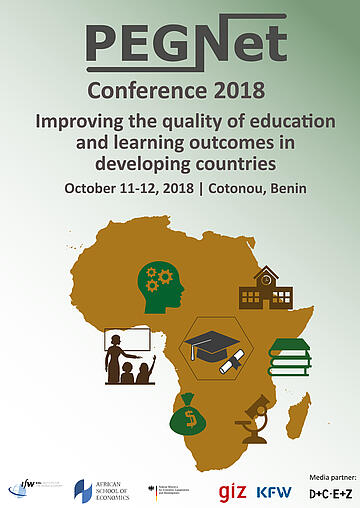PEGNet Conference 2018
Improving the Quality of Education and Learning Outcomes in Developing Countries

The role played by education in furthering growth and sustainable development can hardly be disputed. Access to basic education is a human right and education also constitutes an important component of human development as well as of multidimensional approaches to measure poverty.
In recent decades, universal primary education was made compulsory in most countries and the number of children not attending school has declined. This reduction was mainly driven by developing countries’ commitment to the United Nations Millennium Development Goal (MDG) 2 that aimed to achieve universal primary education by the year 2015. While this goal fell short of its target, global primary enrollment and attainment have risen at an unprecedented rate. Sub-Saharan Africa, in particular, made considerable progress and more than doubled the number of children enrolled in primary schools from 63 million to 158 million in the years between 1990 and 2015.
Despite these positive outcomes, a lot more needs to be done to make education accessible for all. One of the biggest critiques of the MDG 2 was that its focus on achieving universal primary education without setting targets or indicators that addressed the fundamental challenges facing the education sector greatly compromised the quality of education offered in developing countries. Some of the challenges that were not sufficiently addressed include: over-enrollment of pupils, lack of teacher motivation as well as inefficiency of public service delivery. A direct outcome of these concerns has been the current shift in development policy to not only focus on universal access to primary and secondary education but also on the quality of education. This policy shift is best reflected in the newly adopted United Nations Sustainable Development Goal (SDG) 4 that aims to ensure inclusive and quality education for all and to promote lifelong learning by the year 2030.
Improving learning outcomes and skill acquisition have also been highlighted as key requirements for development by the World Bank in their current World Development Report. This report sheds light on the learning crisis that prevails in many developing countries where children are completing primary school without acquiring the basic skills required for further education like numeracy and literacy. Globally, it is estimated that even after at least four years of schooling, close to 125 million children do not have functional literacy or numeracy. The consequences of these low learning levels are particularly evident as these children enter the workforce as young adults without the necessary skills needed for teaching younger generations of students or completing basic tasks. For instance, the World Banks’ Service Delivery Indicators indicate that in 2013, nearly half the teachers in Nigeria could not solve a simple division problem while 70 percent of the teachers in Uganda and 80 percent in Kenya could.
The PEGNet conference 2018 will provide a platform for leading development scholars, practitioners and policy-makers to reflect on the determinants of poor quality education and learning outcomes in developing countries. In addition, the conference will seek to understand the solutions to these challenges and provide answers to questions such as:
What are the barriers and limitations to attaining high levels of education and learning in developing countries?
What role can governments and the private sector play in improving learning? Does outsourcing the provision of education to the private sector eliminate these challenges?
Are cash transfers that are conditional on educational outcomes effective?
How can scholarships be better awarded to ensure that poor and marginalized students and pupils have equal access to education?
How can learning outcomes be measured better in poor settings?
What incentives should be provided to increase the motivation and quality of teachers? Should teachers be regularly trained and tested to ensure that they do not fall behind national standards?
Invited Speakers
Hon. Marie-Odile Atanasso
(Minister of Higher Education and Scientific Research, Benin)Felipe Barrera-Osorio
(Harvard University)Grieve Chelwa
(University of Cape Town)Peter Krahl
(German Federal Ministry of Economic Cooperation and Development)Innocent Matshe
(African Economic Research Consortium)Modibo Sidibe
(Duke University)Leonard Wantchekon
(African School of Economics and Princeton University)
Organizers
The conference was co-organised by the African School of Economics , the Kiel Institute for the World Economy (IfW), the Deutsche Gesellschaft für Internationale Zusammenarbeit (GIZ) on behalf of the German Federal Ministry for Economic Cooperation and Development (BMZ) and supported by the KfW Development Bank.